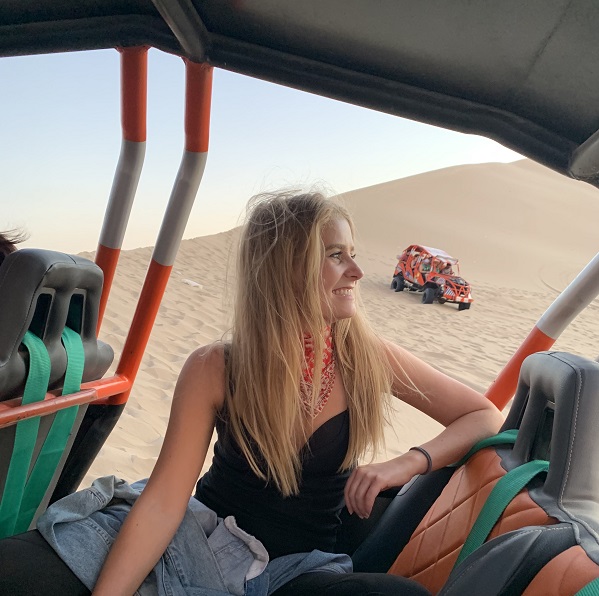
While working as a PR representative for several technology companies, including LinkedIn, Joy Opsvig rubbed shoulders with data scientists and chief economists. Her job was to gain positive media coverage for her clients by extracting data-driven insights from the product and research reports.
For example, an email marketing software company has valuable user data that can be used to determine the optimal time for retailers to send emails during the holiday season to guarantee the highest possible open rate. Meanwhile, LinkedIn has become an authority on global workforce trends because of the sheer number of users on its platform.
Joy found herself gravitating towards the power of data to tell captivating stories. At the onset of the pandemic, she ran a global small business survey to understand how small businesses were being impacted. She also worked with Upwork’s Chief Economist to share his insights on how the pandemic was impacting remote work and work/life balance, and which skills were in highest demand as the world shifted to studying, socializing and working online.
Finally, Joy realized she wanted to change careers. Last year, she quit her job in PR to focus on her studies in Springboard's Data Science Career Track. She recently landed a data science engineer position through LinkedIn’s apprenticeship program, which is designed for people with non-technical backgrounds who want to transition into the tech industry.
I started my career in communications managing PR for tech companies. I was living in San Francisco and working at an agency. My clients ranged from small app companies to B2B enterprises. Essentially, I supported media relations by sharing our clients’ stories with the world. One way to do that is announcing product launches. Another way is to have really interesting data and insights to tell the story of the product or the user journey. Consequently, I worked closely with our clients' data science teams and several chief economists, and I helped them ideate interesting data polls about their users. Through this work, I fell in love with the ability to use data to tell really interesting stories.
Springboard had come highly recommended to me from people who had completed the Data Science Career Track. There were a couple benefits Springboard offered that were really important to me. One was being able to study at my own pace. I was traveling full-time and I had quit my job to study at Springboard, so it was really important to me to study on my own schedule.
The mentorship was incredibly helpful, but so was the community. Even though I wasn't in a classroom, I could use the Slack channel for any questions I had or if I needed feedback on something.
As a career changer, it's really nice to have that support system and to be connected to people who are going through the same thing.

I was fortunate to have really interesting clients including LinkedIn. I worked on their monthly Workforce Report where we studied workforce trends like how are people moving from location to location? What skills gaps are there, and which skills are on the rise? It got me interested in this idea of using data for good.
I was fortunate to work at an agency where I could craft this niche role because it tied into the work we were doing. I was given free rein to explore that because it was beneficial to the company. By learning about data, I could ask better questions to understand our clients’ research so we could share those insights to help the world make better decisions–whether it’s something as simple as email marketing strategy or whether someone should move to a new state for a job.
This apprenticeship is a dream come true for me because I worked with LinkedIn in the past. I knew it was an incredible company because they live by their mission, which is to create economic opportunity for the world’s workforce.
This apprenticeship is specifically for folks with non-traditional backgrounds looking to get into tech. One person is a former makeup artist, another used to work at a bank. I’m one of two data scientists in my specific cohort, but there are all types of engineers in the apprenticeship program.
About 80% of my role is focused on data science work, and 20% is dedicated to learning, such as taking college courses, online courses, or doing independent study. They provide the space for you to learn and grow and are very supportive of the learning process.

It was not a typical application process where you submit a resume and cover letter. The first part was a series of essays–and your responses were anonymous because you did not submit a resume or any background information along with them. The questions are focused on: How will you bring your unique perspective to LinkedIn as someone with a non-traditional career path? What is your interest in LinkedIn, and why are you passionate about this type of work? So I talked about my experience as a communications manager for data science teams. The next part of the application was a take-home assignment. Mine was an end-to-end data science project–from exploratory data analysis to building a predictive model. It was basically a replica of the projects I’d done for Springboard. I felt so prepared to do this project because of my experience with Springboard.
I think that's a wonderful way to put it. It's so human. Writing the essays felt amazing because I got to share who I am as a person.

Springboard gave me the confidence to pursue this career and follow my passion. I wouldn't have gotten this job at LinkedIn if I hadn't studied at Springboard. It put me on the right trajectory which is why I am so incredibly grateful for this experience.





